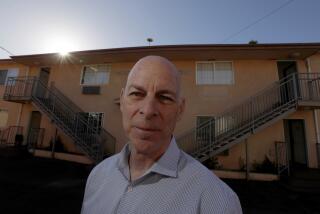Man Turns Disability Into Chance to Serve
- Share via
Edgar Obando’s life journey has been bumpy, even perilous, at times. But rather than choosing the path of least resistance, the former fruit vendor and longtime community activist has decided to serve as an advocate for public-housing residents in Pacoima.
The 52-year-old native of Nicaragua had quietly tackled his community’s challenges for nearly a decade, serving until recently as the president of a nonprofit social-service organization.
But a disabling gunshot wound 12 years ago catapulted Obando into the social-activist role that changed his life.
“After I was shot, I couldn’t work anymore,” Obando said of the near-fatal injury he suffered after an argument with a neighbor. “So I decided I had to do something to improve life in the projects. I decided to help the community.”
“Because of what happened to him, he totally changed,” said Mario Matute, a project manager for the Valley Economic Development Center and former community service director for the San Fernando Gardens. “He became concerned with what’s going on in the community and with other residents. He found his place.”
That place was the Housing Authority Residents Advisory Council, or HARAC, an alliance of the Housing Authority of the city of Los Angeles and public-housing residents. HARAC addresses apartment dwellers’ safety and social-service needs.
About 10 years ago, while recuperating from his internal injuries, Obando began organizing the Gardens’ residents to help clean up the area’s graffiti and garbage.
Realizing that the public-housing complex needed far more than cosmetic improvements, he helped create, and then was elected a representative to HARAC, a seven-year tenure that saw many improvements to the city-run projects.
Seeking funds to modernize Pacoima’s aging public-housing units, Obando in 1990 collected 400 resident signatures for a petition that was sent to the Housing Authority. The response: enough money to remodel 25 units. The job was completed in 1997.
Obando’s efforts also have resulted in the establishment of citizenship classes and an active community center at San Fernando Gardens.
In 1997, Obando, with help from local legal-aid lawyers, applied for a grant from the U.S. Department of Housing and Urban Development, which awarded the housing project and two local social service agencies $500,000 for child-care and job-training programs. Nineteen residents are now licensed to provide home-based child care.
Two years ago, Obando also established the Resident Management Corp., a nonprofit organization that offers bilingual assistance and social services to public-housing residents.
Because of recurring health problems, Obando recently ended his three-year tenure as president of his advocacy organization, handing over the reins to his 47-year-old wife, Sandra. She has organized a transportation service that takes residents to jobs and medical appointments.
“When you live in public housing, there is so much to do to help the residents,” Sandra Obando said. “We want to be positive role models for the kids and the parents here.”
“I respect the Obandos,” Matute said, “because although they’re public-housing residents, they’re not there just to receive assistance. They get involved without expecting anything in return. That’s the beauty of it.”
*
Personal Best is a weekly profile of an ordinary person who does extraordinary things. Please send suggestions on prospective candidates to Personal Best, Los Angeles Times, 20000 Prairie St., Chatsworth 91311. Or fax them to (818) 772-3338. Or e-mail them to valley.news@latimes.com
More to Read
Sign up for Essential California
The most important California stories and recommendations in your inbox every morning.
You may occasionally receive promotional content from the Los Angeles Times.













